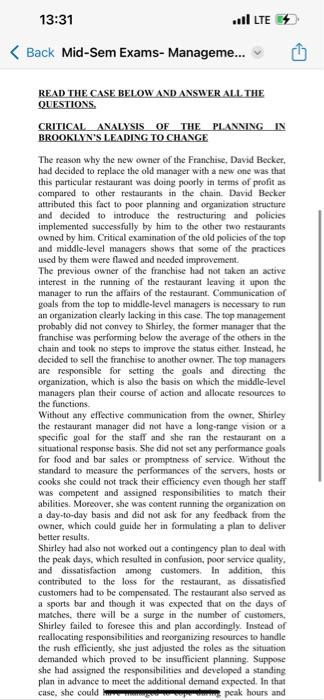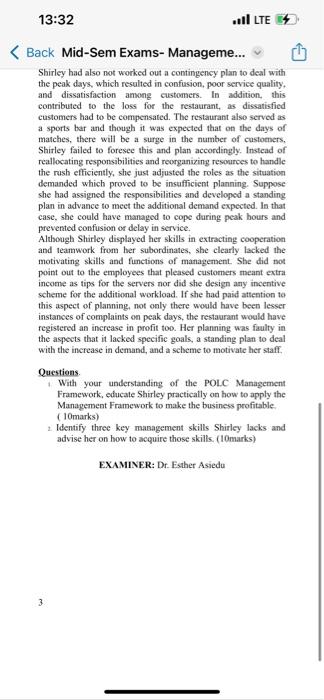QUESTIONS. CRITICAL ANALYSIS OF THE PLANNING IV BROOKLVN'S LEADING TO CHANGE The reason why the new owner of the Franchise, David Becker, lad deeided to replace the old manager with a new one was that this particular restaurant was doing poorly in terms of profit as compared to other restaurants in the chain. David Becker attributed this fact to poot planning and organization structure and decided to introduce the restructuring and policies implemented successfully by him to the other two restaurants owned by him. Critical examination of the old policies of the top and middle-level managers shows that some of the practices used by them were flawed and needed improvement. The previous owner of the franchise had not taken an active interest in the running of the restauram leaving it upon the manager to run the affairs of the restaurant. Communication of goals from the top to middle-level managers is necessary to num an organization clearly lacking in this case. The top management probably did not convey to Shirley, the former manager that the franchise was performing below the average of the others in the chain and took no steps to improve the status either. Instead, be decided to sell the franchise to another owner. The top managers are responsible for setting the goals and directing the organization, which is also the basis on which the middle-level managers plan their course of action and allocate resourees to the functions. Without any effective communication from the owner, Shirley the restaurant manager did not have a long-tange vision or a specific goal for the staff and she ran the restaurant on a situational response basis. She did not set any performance goals for food and bar sales or promptness of service. Without the standard to measure the performances of the servers, hosts or cooks she could not track their efficiency even though ber staff was competent and assigned responsibilities to match their abilities. Moreover, she was content running the organization on a day-to-day basis and did not ask for any feedback from the owner, which could guide ber in formulating a plan to deliver better results. Shirley had also not worked out a contingency plan to deal with the peak days, which resulied in confusion, poor service quality, and dissatisfaction among customers. In addition, this contributed to the loss for the restaurant, as dissatisfied customers had to be compensated. The restaurant also served as a sports bar and though it was expected that on the days of matches, there will be a surge in the number of customers, Shirley failed to foresee this and plan accordingly. Instead of reallocating responsibilities and reorganizing resourees to handle the rush efficiently, she just adjusted the roles as the situation demanded which proved to be insufficient planning. Suppose she had assigned the responsibilities and developed a standing plan in advance to meet the additional demand expected. In that Shirley had also not worked out a contingency plan to deal with the peak days, which resulted in confusion, poor service quality, and dissatisfaction among customers. In addition. this contributed to the loss for the restaurant, as dissatisfied customers had to be compensated. The restaurant also served as a sports bar and though it was expected that on the days of matches, there will be a surge in the number of customers, Shirley failed to foresee this and plan accordingly. Instead of reallocating responsibilities and reorganizing resources to handle the rush efficiently, she just adjusted the roles as the situation demanded which proved to be insufficient planning. Suppose she had assigned the responsibilities and developed a standing plan in advance to meet the additional demand expected. In that case, she could have mamaged to cope daring peak bours and prevented confusion or delay in service. Although Shirley displayed her skills in extracting cooperation and teamwork from her subordinates, she clearly lacked the motivating skills and functions of management. She did not point out to the employees that pleased customers meant extra income as tips for the servers nor did she design any incentive scheme for the additional workload. If she had paid attention to this aspect of planning, not only there would have been lesser instances of complaints on peak days, the restaurant would have registered an increase in profit too. Her planning was faulty in the aspects that it lacked specific goals, a standing plan to deal with the increase in demand, and a sebeme to motivate her staff. Questions. With your understanding of the POL.C Management Framework, educate Shirley practically on how to apply the Management Framework to make the business profitable. ( 10marks) 2. Identify three key management skills Shirley lacks and advise her on how to acquire those skills. ( 10 marks)








